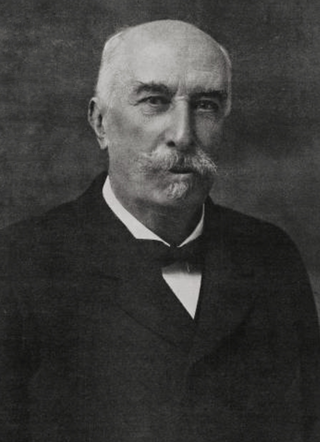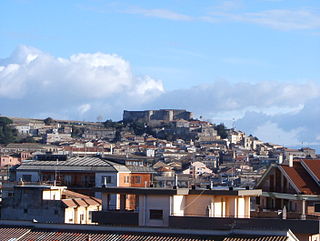Related Research Articles

Giovanni Giolitti was an Italian statesman. He was the Prime Minister of Italy five times between 1892 and 1921. He is the longest-serving democratically elected Prime Minister in Italian history, and the second-longest serving overall after Benito Mussolini. A prominent leader of the Historical Left and the Liberal Union, he is widely considered one of the most powerful and important politicians in Italian history; due to his dominant position in Italian politics, Giolitti was accused by critics of being an authoritarian leader and a parliamentary dictator.

Francesco Saverio Vincenzo de Paola Nitti was an Italian economist and political figure. A member of the Italian Radical Party, Nitti served as Prime Minister of Italy between 1919 and 1920. An opponent of the fascist regime in Italy, he opposed any kind of dictatorship throughout his career. According to the Catholic Encyclopedia in "Theories of Overpopulation", Nitti was also a staunch critic of English economist Thomas Robert Malthus and his Principle of Population; Nitti wrote Population and the Social System (1894). He was an important meridionalist and studied the origins of Southern Italian problems that arose after Italian unification.

The province of Vibo Valentia is a province in the Calabria region of southern Italy, set up by a national law of 6 March 1992 which came into effect on 1 January 1996, and formerly part of the Province of Catanzaro. Its capital is the city of Vibo Valentia and its vehicle licence plate code is VV. The province has an area of 1,139 square kilometres (440 sq mi), and a total population of 168,894 ; the city Vibo Valentia has a population of 35,405. There are 50 comuni in the province, see list of communes of the Province of Vibo Valentia.

Vibo Valentia is a city and comune (municipality) in the Calabria region of Southern Italy, near the Tyrrhenian Sea. It is the capital of the province of Vibo Valentia, and is an agricultural, commercial and tourist center. There are also several large manufacturing industries, including the tuna district of Maierato. Very important for the local economy is Vibo Marina's harbour.

Tommaso Tittoni was an Italian diplomat, politician and Knight of the Annunziata. He was Italy's foreign minister from 1903 until 1909, except for a five-month period. He also was interim prime minister for about two weeks in March 1905, making him the shortest-serving prime minister in the history of Italy.

Maida is an Arbëreshë town and comune in the province of Catanzaro, in the Calabria region of southern Italy. The British routed the French in the Battle of Maida in 1806, as part of the War of the Third Coalition.

Spilinga is a comune (municipality) in the Province of Vibo Valentia in the Italian region Calabria, located about 70 kilometres (43 mi) southwest of Catanzaro and about 15 kilometres (9 mi) west of Vibo Valentia. As of 31 December 2004, it had a population of 1,665 and an area of 18.7 square kilometres (7.2 sq mi).
Nicola Squitti was born on July 26, 1853, in Maida, Catanzaro, Kingdom of the Two Sicilies, died January 3, 1933. in Rome, Italy.

The Cimino family, Cimini or Cimina Whether all beares of this name are related can most likely be dismissed, the variations of the spelling and transcript will vary from source to source, and as research goes on it may change the information in this article. The origin of the name is disputed, but certainly a branch of the family has taken the name from the Cimini Hills, in Latium. The origin of the Cimini name in this context goes back to the Etruscan era. The use of Cimini as a family name can be traced through history. In a study of family names in Roman Legions, the name DeCiminus is found C. Catullius DeCiminus of Troyes was a Roman Federal priest of the Roman Cult in 210 AD, who dies in Lyon. The name Ciminius is also documented in "Repertorium nominum gentilium et cognominum latinorum" The "Journal of Archaeology" states "Ciminius" as a known gentilitium nomina in ancient Rome. The ending "nius" is a clear indicator to the names Etruscan origin (which also may have the ending "na". C. Ciminius is registered as vicomagister of the vicus Silani Salienti first half of the second century, under the reign of Claudius.
Giuseppe Bardari was an Italian lawyer and writer. Although chiefly known today for having written the libretto for Donizetti's 1835 opera, Maria Stuarda, he played a prominent role in the judiciary of Naples in the years leading up to the unification of Italy.
Events from the year 1893 in Italy.
Events from the year 1892 in Italy.
Events from the year 1909 in Italy.

The strada statale 18 "Tirrena Inferiore" is an Italian state road, connecting Campania and Calabria. It is among the longest and most important state highways in southern Italy, considering that it follows the Tyrrhenian coast, from Salerno to Reggio di Calabria.

The Accademia degli Umoristi founded in 1603 was a learned society of intellectuals, mainly noblemen, that significantly influenced the cultural life of 17th century Rome. It was briefly revived in the first half of the eighteenth century by Pope Clement XI.

The Gulf of Saint Euphemia is a gulf on the west coast of Calabria, southern Italy. It is part of the Tyrrhenian Sea and borders the province of Cosenza, the province of Catanzaro, and the province of Vibo Valentia.
The Mancuso 'ndrina is a clan of the 'Ndrangheta, a criminal and mafia-type organisation in Calabria, Italy. The 'ndrina is based in Limbadi and Nicotera and is considered by the investigative bodies as the most influential clan in the province of Vibo Valentia.

Vincenzo Calenda, baron of Tavani was an judge in the Kingdom of the Two Sicilies and the Kingdom of Italy. He was also a senator of the Kingdom of Italy and Minister of Justice in the third and fourth Crispi governments.

Giulio Rodinò di Miglione was an Italian politician. He was among the founders of the Italian People's Party (1919) (PPI) and of the Christian Democrats (1942).
References
- ↑ "Dalle Carte Di Giovanni Giolitti," - 1962
- ↑ Archived 2007-03-11 at the Wayback Machine Italian Archives
- ↑ "Vibo Valentia 1900-1929". Archived from the original on 2006-05-06. Retrieved 2006-08-19.
- ↑ Nobility of Italy, The Mormon Library(The Church of Jesus Christ of Latter-day Saints)- UTAH
- ↑ Istituzioni di Diritto Vivile Romano di Eduardo Bocking, NAPOLI, 1885